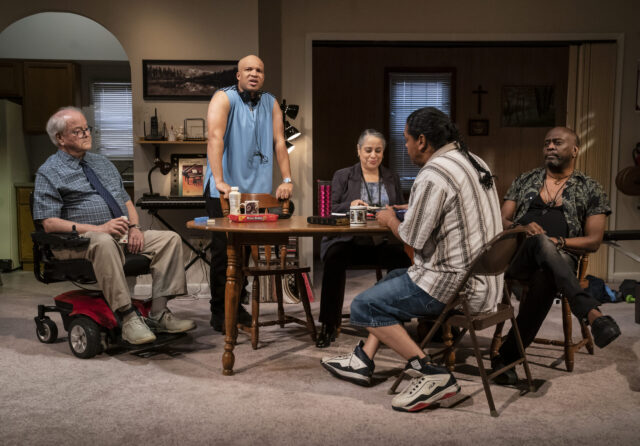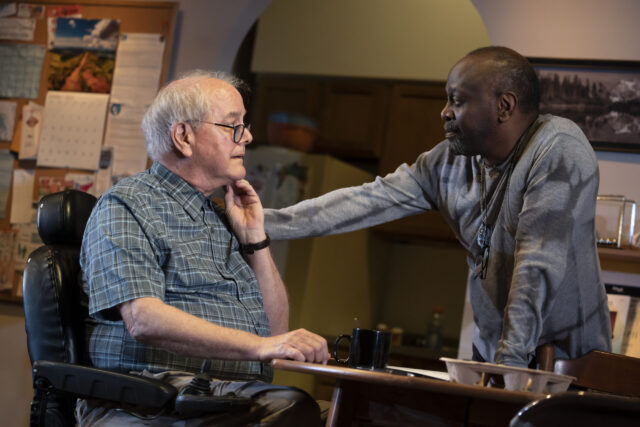
Andy (Tim Hopper) and Em (Sally Murphy) have something to say to Fred (Francis Guinan, at left) in Downstate (photo by Joan Marcus)
DOWNSTATE
Playwrights Horizons, Mainstage Theater
416 West 42nd St. between Ninth & Tenth Aves.
Tuesday – Sunday through January 7, $61-$101
www.playwrightshorizons.org
“If you knew in advance exactly what was going to happen in your life, and how everything was going to turn out, and if you knew you couldn’t do anything to change it, would you still want to go on with your life?” Bee asks Jay in Bruce Norris’s A Parallelogram. “What if it turned out to be for the best if we’d never even existed?”
That question is central to Norris’s latest work, Downstate, extended through January 7 at Playwrights Horizons. One of the best plays of the millennium, Downstate takes an unusual angle on child molesters, making us see them as human rather than evil demons, eliciting compassion but not sympathy while delving into the concept of victimhood from all sides.
“I used to fantasize about how I would kill you,” Andy (Tim Hopper, now replaced by Brian Hutchison) tells his abuser, Fred (Francis Guinan), as Andy calmly reads from a reconciliation contract. “I would park outside your apartment and wait until you pulled in the driveway. And I would bring along my mother’s thirty-eight, the one she kept in her bedside table, and when you stepped out of your car I would hold it against your head and duct tape your mouth so I wouldn’t have to listen to any of your toxic bullshit . . . and I’d drive you to the edge of the forest preserve, and you’d kneel down in the dirt . . . and I’d rip the tape off your mouth and jam the barrel of the gun down your throat so that you —” Andy is cut off by several interruptions before accusing Fred of “exploiting my trust. By enlisting my sympathy. But you will never be deserving of sympathy.”
Em (Sally Murphy), Andy’s wife, says to Fred, “How can I ever explain to my child why Daddy is sometimes sad? Why he’d rather sit alone in the dark instead of using the PlayStation? Children need answers. And they need to know that some monsters are real.”
It’s a tough topic to navigate onstage; in recent years, David Harrower’s Blackbird, Paula Vogel’s How I Learned to Drive, and Jennifer Haley’s The Nether successfully tackled the issue from different angles, but Norris offers several new twists that test the standard dynamic that good and evil are black-and-white.

Four residents of a group home for convicted child molesters meet with parole officer Ivy Delgado (Susanna Guzmán) (photo by Joan Marcus)
Fred is an easygoing old man in a motorized wheelchair who speaks gently; in the script, Norris compares him to Mr. Rogers (whose first name is Fred). Fred was a piano teacher and still has a fondness for Frédéric Chopin, who he is quick to point out led a tragic life after the family of the woman he loved rejected their relationship. All four molesters in the home still believe what they did to their victims was done out of love and understanding, despite what the law and society dictate. Fred has a small keyboard in the living room, where he fake-plays to a CD of Chopin’s “Raindrop” Prelude, the drip-drip-drip of the music evoking the repetitive nature of the crimes by child abusers who think they are in love.
The home is run by Dee (K. Todd Freeman), an impassioned gay man who does the shopping and tries to keep everyone sane; he’s especially supportive of Fred, although he still angrily defends what he himself did to a teenage boy. Fast-talking, Bible-quoting Gio (Glenn Davis) is the youngest of the four and is facing the shortest sentence; convicted of statutory rape of a girl he thought was “old enough,” he considers himself to be better than the others, not an abuser, and has grand plans for starting his own business. Felix (Eddie Torres) is the quiet one who keeps to himself, although he has a problem with lying, especially to the group’s parole officer, Ivy Delgado (Susanna Guzmán), who lets them all know when they have broken the rules of their closely supervised release. The four men are tracked by ankle monitors and are not allowed to use the internet or a cellphone.
When Ivy announces that the local community has passed rulings further limiting their movement, they are furious, but she points out, “Well, ya know what? Nobody really wants y’all livin’ anywhere, much less in their neighborhood.” Dee says, “Why not put us on a desert island?” Gio suggests, “Y’all oughta be banished from human society.”
Gio works with the pert and cheeky Effie (Gabi Samels), who is not a fan of the police. When she shows up to drive Gio to their job, Ivy asks to see her ID. Effie repeatedly states, “Am I being detained?” Ivy then asks her name, to which Effie replies again and again, “I do not consent to the question.” It’s a comic scene, but it brings to the surface the critical ideas of detention and consent.
Things get even more heated in the second act when Andy returns, with more to say to Fred.
Downstate is brilliantly directed by Tony and Obie winner Pam MacKinnon, who previously helmed Norris’s Tony-, Olivier-, and Pulitzer Prize–winning Clybourne Park and The Qualms (as well as superb Broadway adaptations of Edward Albee’s A Delicate Balance and Who’s Afraid of Virginia Woolf?). MacKinnon accounts for every gesture, every interaction, every line of dialogue, making sure each aspect of the story is fully believable, from fighting over the bathroom to bickering over unripe bananas, the latter a reference to children too young for sex; it’s no coincidence that Dee sees no problem with them, telling Gio, who refuses to pay for his share of the bananas because they are too green, “Didn’t want bananas for next week, I wanted bananas for immediate consumption.” Norris and MacKinnon succeed in making the four abusers into a kind of family, with Ivy the de facto parent.

Fred (Francis Guinan) and Dee (K. Todd Freeman) share a rare tender moment in Downstate (photo by Joan Marcus)
Todd Rosenthal’s set is deceptively cozy, a cutaway living room above which is a roof with a satellite dish, emphasizing the limitations of the men’s lives. A flatscreen TV fills the fireplace, blocking the possibility of real warmth. Gio’s exercise equipment is in one corner, in front of Felix’s room, where Felix spends most of the show, behind an accordion door. The window next to the front door is broken, the result of a shotgun blast from an unhappy person in the neighborhood. (The lighting is by Adam Silverman, with sound by Carolyn Downing and costumes by Clint Ramos.)
The cast is exceptional; an ever-present tension hovers over the space as the characters interact as if on the edge of a knife. Guinan (Tribes, The Night Alive) is soft and gentle as Fred, who appears to be tender and harmless, especially in the wheelchair, but he has a dark past. Davis (Bengal Tiger at the Baghdad Zoo, The Christians) is a bundle of nonstop energy as Gio, while Torres, who is primarily a director (Familiar, Water by the Spoonful), makes the most of his few scenes. Two-time Tony nominee and Obie winner Freeman (Airline Highway, Song of Jacob Zulu) is a powder keg as Dee, ready to explode at any moment with the slightest provocation. Samels, in her off-Broadway debut, is electric as Effie, who speaks her mind, not afraid to hang out in a house of sexual predators. At one point she tells Gio, “A workplace is a safe space,” which also reveals a certain naivete.
Hopper (Go Back to Where You Are, More Stately Mansions) is a bundle of nerves as Andy, whose abuse at the hands of Fred has tortured him as he searches desperately for closure, while Murphy (The Minutes, August: Osage County) is forceful and tenacious as Em, who wants her husband to finally be free from pain.
Guzmán (La Luz de un cigarillo, Comida de Puta) is firm and unyielding as Ivy, especially when the concept of victimhood is raised. She tells Felix, “I got forty-seven clients, aright? Forty-seven of y’all I gotta deal with on a weekly basis all shapes and sizes but ya all got one thing in common, okay? Every one of you’s a victim. Everybody’s misunderstood, been done wrong, system’s broke, system ain’t fair blah blah, and that may or may not be the case — but I’ll tell ya something. If y’all feel so victimized? Maybe that gives ya a little idea how ya made other people feel, okay?”
Norris (The Low Road, Domesticated) was inspired to write Downstate by the sociopolitical disconnect between the right and the left in the United States, how the liberals and the conservatives are unable to talk to each other and resolve their differences in any constructive way, instead demonizing the supposed enemy.
The horror of child abuse is one thing that everyone agrees on; in 2019, New York State passed the Child Victims Act, which gave survivors a one-year window to file claims that had been barred by the statute of limitations, leading to approximately ten thousand lawsuits. The vote was 63-0 in the Senate and 130-3 in the Assembly. This past May, New York governor Kathy Hochul signed into law the Adult Survivors Act, which gives survivors who were abused when they were over eighteen a one-year lookback to pursue legal recourse.
In the must-see Downstate, Norris offers a compelling, thought-provoking, and exquisitely rendered exploration of our humanity as a people; it’s about child sexual abuse, justice, and victimhood, but it’s also about so much more.